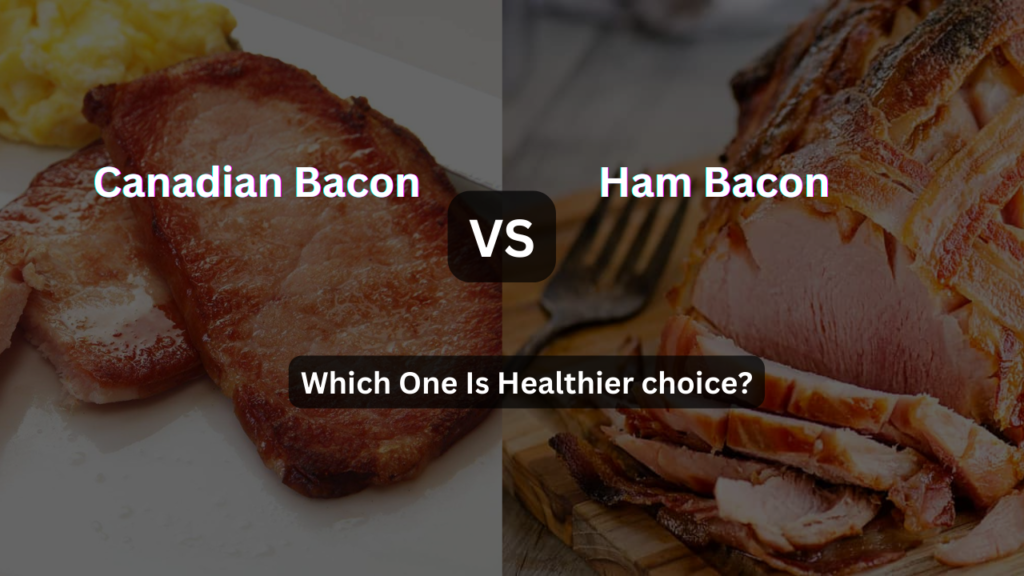Canadian bacon, with its delicate pink hue and smoky allure, often finds its way onto breakfast plates and omelets. But beneath its appetizing veneer lies a question that sparks endless debate: is Canadian bacon healthy? Fear not, breakfast enthusiasts, for we’re delving into the depths of this culinary conundrum, unearthing its nutritional secrets, and uncovering its place in a balanced diet.
Canadian Bacon vs. Regular Bacon
Before dissecting Canadian bacon’s health halo, we must understand its identity. Unlike its American counterpart, sliced from the pig’s belly, Canadian bacon hails from a leaner region – the pork loin. This translates to significantly less fat and calories, making it a potential contender for the “healthier bacon” crown.
Fat Facts: Unveiling the Lean Truth
Let’s get down to the numbers. A two-ounce serving of Canadian bacon boasts roughly 5 grams of fat compared to a whopping 14 grams in regular bacon. That’s a 64% reduction! This lower fat content translates to fewer calories, with Canadian bacon clocking in at 70 calories per serving versus regular bacon’s 170.

Protein Powerhouse: Fueling Your Day
But Canadian bacon isn’t just about what it lacks; it’s also packed with what it offers. Each serving delivers a satisfying 12 grams of protein, essential for building and repairing tissues, keeping you feeling full, and supporting muscle growth. This protein punch makes it a valuable inclusion in post-workout meals or a hearty start to your day.
Vitamin & Mineral Bounty: Beyond the Basics
Canadian bacon isn’t a one-trick pony. It’s a treasure trove of essential vitamins and minerals, including:
- Vitamin B12: Crucial for nerve function and red blood cell production.
- Zinc: Boosts immunity and supports cell growth.
- Selenium: Protects cells from damage and plays a role in thyroid function.
- Iron: Carries oxygen throughout the body, vital for energy production.
The Sodium Sidekick: A Balancing Act
While its nutritional profile shines, Canadian bacon isn’t without its caveats. Its Achilles’ heel? Sodium. A single serving packs around 500mg of sodium, roughly one-third of the recommended daily intake. This can be a concern for individuals with hypertension or those needing to restrict their sodium intake. Moderation is key to enjoying Canadian bacon without exceeding your daily sodium limit.

Cooking Up Health: Smart Preparation Tips
How you prepare Canadian bacon significantly impacts its health quotient. Ditch the greasy griddle and embrace healthier cooking methods like:
- Baking: Preheat your oven to 400°F (200°C) and bake Canadian bacon strips for 15-20 minutes until crispy.
- Air Frying: Use a preheated air fryer at 400°F (200°C) for 10-12 minutes to achieve a guilt-free crunch.
- Pan-Searing: Heat a non-stick pan over medium heat and sear Canadian bacon strips for 3-4 minutes per side, using minimal oil.
Beyond the Breakfast Plate: Versatile and Delicious
Canadian bacon’s potential extends far beyond breakfast. Here’s how to incorporate it into your meals:
- Salads: Add diced Canadian bacon for a savory protein boost and smoky flavor.
- Sandwiches: Pair it with avocado, lettuce, and tomato for a satisfying lunch option.
- Soups: Shredded Canadian bacon adds depth and umami to lentil or vegetable soups.
- Quiches and frittatas: Dice it up and combine it with cheese and veggies for a protein-packed brunch.
The Verdict: Canadian Bacon – Friend or Foe?
So, is Canadian bacon healthy? The answer, like most things in life, isn’t black and white. It’s a leaner and more protein-rich alternative to regular bacon, brimming with essential vitamins and minerals. However, its sodium content requires mindful consumption. Ultimately, Canadian bacon can be a healthy addition to your diet when enjoyed in moderation and paired with nutritious ingredients.

The Key to Savoring Canadian Bacon
Remember, a balanced diet is key to optimal health. Enjoy Canadian bacon as part of a varied and nutritious meal plan, focusing on whole foods, fruits, vegetables, and fiber-rich grains. By being mindful of portion sizes and cooking methods, you can indulge in this smoky treat without compromising your health goals.
Resources & References
- USDA FoodData Central: https://fdc.nal.usda.gov/: Comprehensive nutritional data for various food items, including Canadian bacon.
- Academy of Nutrition and Dietetics: https://www.eatright.org/: Provides evidence-based information on nutrition and healthy eating.
- American Heart Association: https://www.heart.org/en: Offers resources on heart health, including information on sodium intake.
FAQs about Canadian Bacon and Your Health
Is Canadian bacon healthier than regular bacon?
Yes, generally speaking, Canadian bacon is considered a healthier option than regular bacon. It contains significantly less fat and calories per serving, making it a better choice for managing weight and heart health. Additionally, Canadian bacon has a higher protein content, making it more satiating and beneficial for muscle building.
What are the health benefits of Canadian bacon?
Canadian bacon can offer several health benefits due to its nutritional profile:
- Lower in fat and calories: This makes it easier to keep your calorie intake in check and supports weight management goals.
- High in protein: Protein helps build and repair tissues, promotes muscle mass, and keeps you feeling full, ultimately contributing to good health.
- Good source of vitamins and minerals: Canadian bacon provides vitamin B12, zinc, selenium, and iron, all essential for various bodily functions and overall well-being.
What are the drawbacks of Canadian bacon?
While Canadian bacon can be a healthier choice, it’s important to be mindful of its downsides:
- High sodium content: A single serving can pack a significant amount of sodium, exceeding the recommended daily intake for some individuals. High sodium intake can contribute to high blood pressure and heart disease.
- Processing concerns: Many commercially available Canadian bacon products contain added nitrates, preservatives, and sugars. Opting for minimally processed options with no or minimal additives is crucial for maintaining a healthy diet.
How can I healthily enjoy Canadian bacon?
Here are some tips for incorporating Canadian bacon into your diet without compromising your health:
- Practice portion control: Stick to 2-3 ounces per serving and pair it with other protein sources like eggs or beans for a balanced meal.
- Choose wisely: Look for minimally processed options with no added sugars or nitrates. Opt for brands with “natural” or “uncured” labels.
- Be creative: Explore healthier ways to enjoy Canadian bacon beyond breakfast sandwiches. Dice it for salads, add it to stir-fries, or use it as a topping for whole-wheat pizzas.
- Mind the sodium: Rinse Canadian bacon before cooking to remove some of the salt content.
Are there any healthier alternatives to Canadian bacon?
Yes, several healthier alternatives offer similar flavors and textures:
- Turkey bacon: A leaner option with even less fat and calories than Canadian bacon.
- Chicken bacon: Made from chicken breast, it’s another low-fat, protein-rich alternative.
- Tempeh bacon: A plant-based option with a smoky, savory flavor and a good source of protein and fiber.


